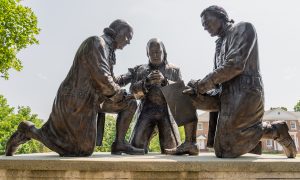Not since the Civil War has the United States faced such ill winds as we experience this Independence Day.
The very idea of American democracy is under assault from internal forces convinced they are the lone defenders of democracy. The American flag has become a symbol of partisanship rather than federation. And the Christian flag has been stitched together with the American flag in an unholy union.
We stand on the precipice of a presidential election in which both major parties ought to fire their presumptive nominees — one because he is the embodiment of anti-democratic dictatorship and the other because he appears unable to stop his lunatic opponent.

Mark Wingfield
Americans widely say they’ve seen this presidential election movie before and do not want to watch the rerun. Yet neither party has the wherewithal to change the script.
Amid this, the evangelical church has sold its soul to the devil in search of political power Jesus himself would not bless.
How do we begin to unravel this mess?
First, Christians need to lead the way in declaring America is not, never has been and was not intended to be a “Christian nation.”
America was founded on pluralism. Not the kind of pluralism we know today, but the kind of pluralism that was possible in the 18th century. Many of the founders were Christians, but not all were. And among those who were Christian, none were what we would today call “evangelicals.”
Anyone who tells you otherwise is a liar with an agenda.
I’ve often joked that I grew up in a Southern Baptist church where we celebrated three religious holidays: Christmas, Easter and the Fourth of July — and not necessarily in that order of importance. We were Christian nationalists before anyone knew what that label meant. And we were wrong.
“I grew up in a Southern Baptist church where we celebrated three religious holidays: Christmas, Easter and the Fourth of July.”
The idea of America having a “manifest destiny” from God has been with us from the beginning, and it has been used for evil rather than good from the beginning. Acknowledging this truth is what so many evangelicals are fighting against in public schools and statehouses. They want to keep telling the old, old story the way they like it.
Wishing it weren’t so doesn’t change history; it only changes textbooks.
Baptists were leaders in calling for a constitutional guarantee of religious freedom for people of all faiths and no faith, but today about half of Baptists believe religious freedom should only apply to them.
We must do better in telling our story.

This didn’t really happen. Yet sculptor Stan Watts has created a bronze statue of Founding Fathers John Adams, Benjamin Franklin and Thomas Jefferson kneeling in prayer just after writing the Declaration of Independence, which is still clutched in Jefferson’s hand. The sculpture is titled , “Appeal to Divine Providence.” There is no historical record of Franklin, Adams, and Jefferson doing this. Also, the source of a quote on the statue’s base, attributed to Jefferson, “The Bible is the cornerstone of liberty,” cannot be documented. (Shutterstock)
That famous letter Thomas Jefferson wrote to the Danbury Baptist Association in Connecticut in 1802 should be remembered for more than coining the phrase “a wall of separation between church and state.” Jefferson declared freedom of religion a “natural right.”
By the way, do you know who the Danbury Baptists were seeking relief from? The Calvinists who controlled the state church.
Then in 1947, the U.S. Supreme Court quoted Jefferson’s letter in an important ruling, Everson v. Board of Education.
Neither a state nor the federal government “can pass laws which aid one religion, aid all religions, or prefer one religion over another,” the court wrote. “Neither can force nor influence a person to go to or to remain away from church against his will or force him to profess a belief or disbelief in any religion. No person can be punished for entertaining or professing religious beliefs or disbeliefs, for church attendance or non-attendance. No tax in any amount, large or small, can be levied to support any religious activities or institutions, whatever they may be called, or whatever form they may adopt to teach or practice religion.”
This one Supreme Court precedent alone obliterates the new Louisiana Ten Commandments law and the new Oklahoma edict that all public school teachers teach from the Bibles that must be present in their classrooms.
Second, we who have been labeled “liberals,” “progressives,” “Marxists” and “the woke” need to reclaim patriotism.
Over the past 50 years, evangelicals have coopted the American flag and patriotism for their cause, and we have let them. Yet you do not have to be a conservative evangelical or a Republican to be patriotic.
Two decades ago, when I was elected vice chair of deacons at our church, a person who served along with me in deacon leadership said to me, with a straight face: “I don’t think I’ve ever met a Christian before who was a Democrat. I didn’t know you could be Christian and Democrat.”
This well-educated person who holds a responsible job in the community confirmed that people like me have been silent when we should have spoken loudly. I know a whole lot of Christians who are Democrats. And every Democrat I know loves their country.
The difference is whether we love our country for what it can be or whether we love it for what it has been. It is the promise of freedom for all that drives America, not the nostalgia of freedom for some.
Nowhere has this hostile takeover of patriotism been seen more than in support for our military. The Republican playbook says only conservatives support the military. Yet this is demonstrably false in two directions.
“The Republican playbook says only conservatives support the military. Yet this is demonstrably false.”
Conservatives only love the military as they think it should be — staffed by conscripted minority males and led by heterosexual white males. Republicans in Congress have not loved our military enough to give them pay raises and emotional support and adequate health care as veterans. They are eager to go to war but reticent to fund anything but the war machine itself.
There is a difference between patriotism and nationalism. Patriotism means loving your country; nationalism means believing your country is superior to all others.
We must change the narrative to say it is patriotic to object to unnecessary war; it is patriotic to challenge racism; it is patriotic to demand Congress actually does its job rather than specialize in obstruction; it is patriotic to want freedom for all people; it is patriotic to welcome immigrants and help them; it is patriotic to want our children safe from gun violence; it is patriotic to oppose religious instruction in public schools; it is patriotic to fight for health care for senior adults, the poor and all those “less fortunate” than us.
For too long, we have allowed evangelicals to wrap themselves in the flag while ignoring the promise of freedom it represents. We will not return to tyranny of any kind — especially the tyranny of religious fundamentalists who want a theocracy more than a democracy.
Third, we need to understand that being a Christian and being an American are not the same thing.
You may be an exemplary American without being a Christian. And you may be an exemplary Christian without being an American.
God does not love America more than God loves Germany or Venezuela or Korea or Vietnam. And Americans are not better Christians than Spaniards, Chinese, Kenyans or Australians.
“This ‘Christian America’ concept is racist at its core.”
To claim God has blessed America in ways different than other countries is not only offensive to God but to the rest of the world. This “Christian America” concept is racist at its core. It almost always implies the blessed ones are the descendants of the white European settlers. It seldom includes Native Americans, brown- and black-skinned immigrants and people who speak languages other than English.
Jesus clearly said, “My kingdom is not of this world.” We must not conflate the kingdom of God with the nation of America any more than we blend the American flag with the Christian flag.
There really is no need for a Christian flag anyway, which dates only to 1907. Why does a kingdom not of this world need a worldly flag?
Again, the Christian church in America has fueled this dualism by hauling American flags and Christian flags into our places of worship when neither is necessary there. Both attempt to make Jesus’ kingdom “of this world.”
Because of our spiritual convictions, Christians should celebrate and advance democracy as a fertile seedbed for personal faith. It is in democracy that all people are given the opportunity to flourish in their chosen religious beliefs.
We favor democracy because we are Christians. We are not Christians because we live in a democracy.
This Independence Day, American Christians have two stories of liberty to tell — a story of liberation in Christ and a story of liberation through a democratic government. These are not the same story.
If we could get that straight, we’d be much better patriots and much better Christians.
Mark Wingfield serves as executive director and publisher of Baptist News Global. He is the author of Honestly: Telling the Truth About the Bible and Ourselves and Why Churches Need to Talk About Sexuality. His brand-new book is Troubling the Truth and Other Tales from the News.
Related articles:
Church, state and the ‘Christian agenda’ | Opinion by Bill Leonard
Why is this still happening? | Opinion by Holly Hollman
‘The problem with a theocracy is everyone wants to be Theo’ | Opinion by Bill Leonard
Christian nationalists are misguided Christians, Anthea Butler says


